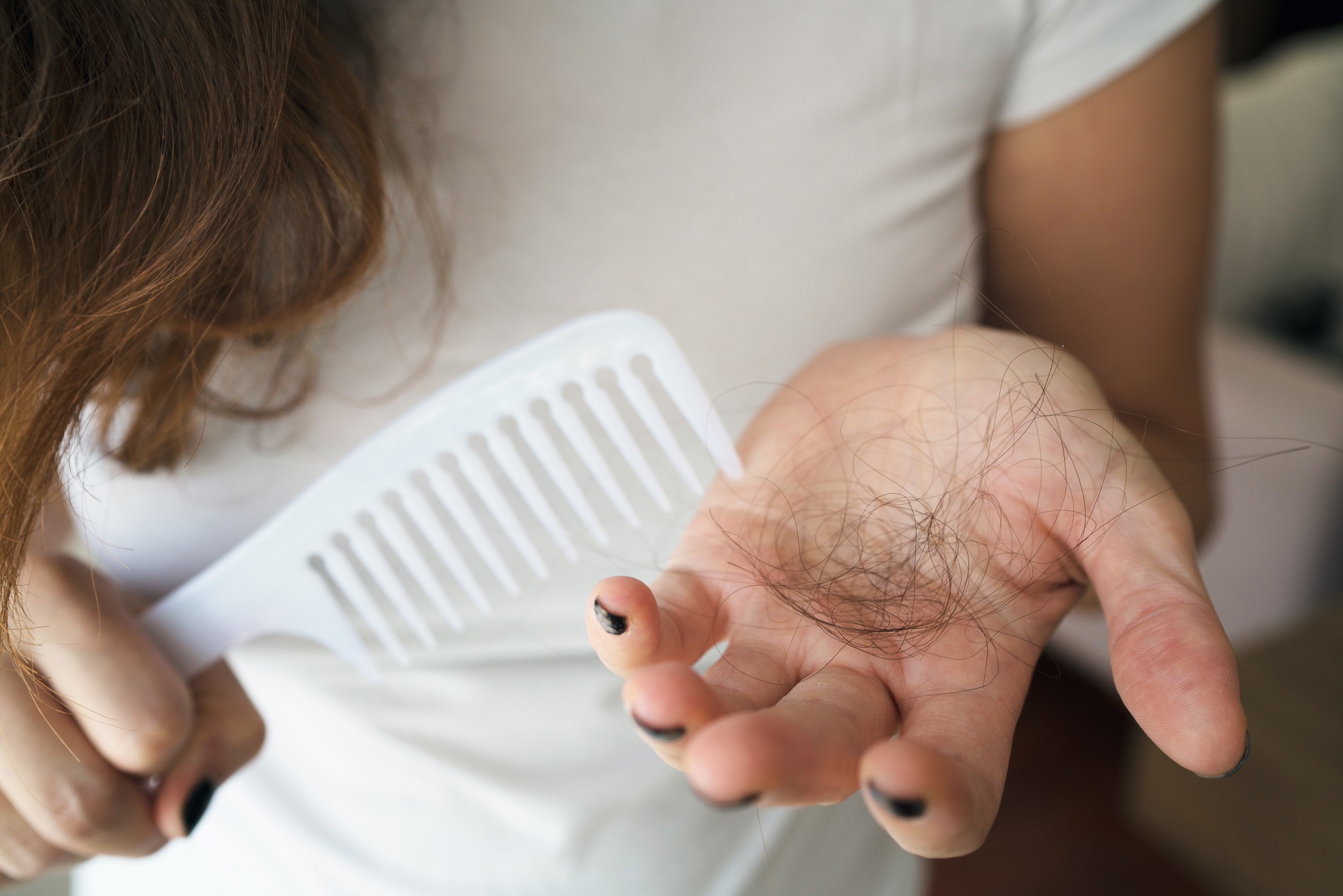Can COVID-19 Cause Hair Loss?

April 21, 2022
On the growing list of lingering effects from COVID-19 comes a jarring one: excessive hair loss.
The phenomenon is especially common among long COVID patients who continue experiencing symptoms such as fatigue, brain fog and shortness of breath weeks or months after recovering from the initial infection. But long COVID patients are often surprised by the hair loss symptom.
“It’s extremely distressing, and it certainly might catch people by surprise,” says Jonathan Shammash, M.D., an internist at Hackensack University Medical Center, which treats hundreds of post-COVID patients at its COVID-19 Recovery Center. “These patients may have thought they were recovered and done. But hair loss might also be associated with other symptoms and signs of post-COVID syndrome.”
Hackensack Meridian Health doctors are seeing “a slew of patients” experiencing hair loss after COVID infection, reflecting larger trends, says dermatologist Alexis Young, M.D.
About 22 percent of patients hospitalized for COVID-19 deal with excess hair loss within six months after discharge, according to 2021 research. “At the beginning of the pandemic, no one was expecting to see this,” Dr. Young says. “Most people are surprised when I tell them they can get hair loss after a stress on the body.”
The Root of the Problem
Healthy people shed about 50 to 100 hairs every day, often without noticing. It’s part of a normal cycle in which hair follicles alternate between “resting” and active growth phases.
But excessive hair loss can occur after a major physical or emotional stressor such as fever, illness, pregnancy, surgery or grief, disrupting the normal hair growth cycle and forcing more hairs into the shedding phase. “It’s not specific to COVID, but very common with COVID,” Dr. Young explains.
Drs. Young and Shammash also believe an overload of inflammation in the body from COVID-19 is part of the equation. Even the psychological stress of having the virus, along with enduring the pandemic itself, may contribute.
“Patients with long COVID can have persistent inflammation that causes a number of symptoms, and one can be this type of hair loss,” Dr. Shammash says.
Prescription for Patience
It can take time for the body to recover from the blow of a severe COVID-19 infection and for hair to grow back.
“It’s a very long process,” Dr. Young says. “I tell patients, ‘You’re not going bald. It will grow back.’ It’s important not to stress about it, because that can actually make it worse.”
She notes that post-COVID hair loss typically shows up two to three months after infection and can continue for several more months. Regrowth happens slowly, taking up to 18 months for hair to look more normal again.
After seeing a doctor to rule out other causes, including anemia or thyroid problems, those concerned about significant hair loss should go back to basics by:
- Eating a healthy diet
- Getting plenty of sleep
- Avoiding unnecessary stress
- Taking supplements, if your doctor recommends
Next Steps & Resources:
- Meet our sources: Jonathan Shammash, M.D., and Alexis Young, M.D.
- To make an appointment with a doctor near you, call 8002-822-8905 or visit our website.
- Learn how Hackensack Meridian Health’s COVID Recovery Center is helping recovered COVID-19 patients with lingering effects of the illness continue on their path to health
The material provided through HealthU is intended to be used as general information only and should not replace the advice of your physician. Always consult your physician for individual care.
Find a doctor near me
Can the Booster Make You Test Positive for COVID?

COVID-19 booster shots: Learn why they won't cause a positive test, Dr. Cicogna explains possible side effects and safety information. Get the facts.
What You Should Know About COVID Vaccines & Menstrual Cycles

Can a COVID-19 vaccine affect a woman’s menstrual cycle? According to a recently published study, here’s what researchers found:
Find a doctor near me

Why We Shouldn’t Treat Omicron Like the Flu or Common Cold
If the omicron variant is more likely to provide milder symptoms, does it really matter how it spreads? The clear answer is yes.

Are Itchy Eyes a Sign of COVID-19?
Itchy eyes and COVID-19? Dr. Rosenberg explains if this is a common symptom and offers prevention tips. Learn more and schedule an appointment.

Why It’s A Bad Idea To ‘Just Get COVID’
Avoid intentional COVID-19 infection. Dr. Cicogna explains the risks, including severe illness and long COVID. Learn more and schedule an appointment.

Does the Booster Protect Against Omicron?
COVID-19 booster shots: Dr. Varga explains Omicron protection, boosting immunity, and scheduling your booster. Call 800-822-8905.
